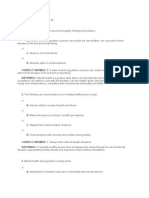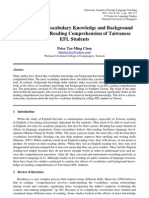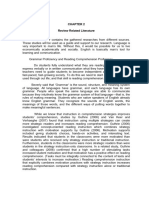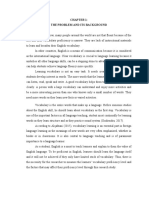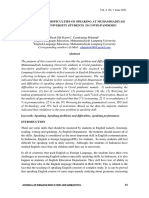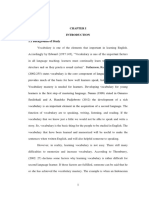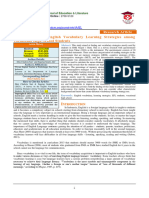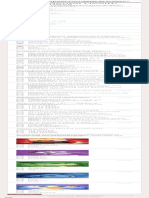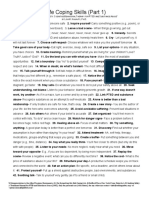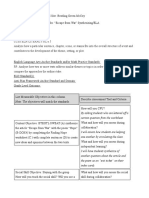Assessment of Senior High Students' English Vocabulary Acquisition Through Context Clues
Assessment of Senior High Students' English Vocabulary Acquisition Through Context Clues
Uploaded by
Niel Vincent CatapangCopyright:
Available Formats
Assessment of Senior High Students' English Vocabulary Acquisition Through Context Clues
Assessment of Senior High Students' English Vocabulary Acquisition Through Context Clues
Uploaded by
Niel Vincent CatapangOriginal Description:
Original Title
Copyright
Available Formats
Share this document
Did you find this document useful?
Is this content inappropriate?
Copyright:
Available Formats
Assessment of Senior High Students' English Vocabulary Acquisition Through Context Clues
Assessment of Senior High Students' English Vocabulary Acquisition Through Context Clues
Uploaded by
Niel Vincent CatapangCopyright:
Available Formats
Assessment of Senior High Students’ English Vocabulary Acquisition
through Context Clues
CHAPTER I
THE PROBLEM AND ITS BACKGROUND
Introduction
Vocabulary learning is dominant in language acquisition, whether the
language is a second or a foreign language, and crucial to the learners overall
language acquisition. According to the study conducted by Ghaderpour,
Moghadam and Zainal (2012), the fundamental reasons for this notion is that
a lot of unknown words, which learners encounter while reading could cause
difficulties in processing the text. Students and teachers alike know that many
of the reading comprehension breakdowns experienced by students involve
word recognition and lexical access.
Finding a context clue is one of the basic strategies of all the readers to
comprehend the meaning of words in a text. Dictionary.com (2019) explained
context clues as hints that an author gives to help define a difficult or unusual
word within a book. The clue may appear within the same sentence as the
word to which it refers or it may follow in the next sentence. Because most of
our vocabulary is gained through reading, it is important that we are able to
recognize and take advantage of context clues.
Using context clues to infer unknown words during reading is a commonly
used strategy for both first language and second language readers. They
added that secondary language learners find this a difficult task due to limited
reading comprehension capacity in the target language. Indeed, compared to
consulting a dictionary, guessing word meanings from context clues can be
less disruptive for extensive reading. Yet, whether this reading strategy can
lead to effective vocabulary learning and successful comprehension of the
text, research suggests various findings.
1. What is the profile of the students in terms of;
1.1 Sex
1.2 Socio-economic status
2. Vocabulary Learning Status
3. Is there a significant difference between the male and female students’
vocabulary knowledge?
4. Is there a significant relationship between the socio-economic status
and the vocabulary knowledge of the students?
The researcher conducted the study to the students of
https://www.readnaturally.com/research/5-components-of-reading/vocabulary
https://files.eric.ed.gov/fulltext/EJ1080725.pdf
https://www.sciencedirect.com/science/article/pii/S1877042812052858
https://www.dictionary.com/e/context-clues/
You might also like
- Mental Health Is Defined AsDocument34 pagesMental Health Is Defined AsFreeNursingNotes100% (2)
- Foundation of EducationDocument198 pagesFoundation of EducationNiel Vincent Catapang100% (2)
- Lesson Plan RationaleDocument4 pagesLesson Plan RationaleKeriCALL4870% (1)
- Career CounselingDocument12 pagesCareer CounselingCarla Joyce100% (2)
- CELT-P Portfolio Task 5 Florina MarinescuDocument4 pagesCELT-P Portfolio Task 5 Florina MarinescuFlorina MarinescuNo ratings yet
- Proposal Bahasa Inggris NONADocument24 pagesProposal Bahasa Inggris NONADian NovitaNo ratings yet
- The Teaching of Vocabulary: A Perspective: Kopertis Wilayah XDocument10 pagesThe Teaching of Vocabulary: A Perspective: Kopertis Wilayah XMuhammad Maulana RizkiNo ratings yet
- Skripsi Pecah BabDocument37 pagesSkripsi Pecah BabRosaNo ratings yet
- ABSTRACTDocument30 pagesABSTRACTSafhira AuraliaNo ratings yet
- Sample Undergrad ThesisDocument29 pagesSample Undergrad ThesisAliehs NalagNo ratings yet
- ChaptersDocument116 pagesChaptersabulgassimgNo ratings yet
- An Analysis On Students' Grammatical Error of Degree of Comparison SentencesDocument49 pagesAn Analysis On Students' Grammatical Error of Degree of Comparison SentencesValbona BytyçiNo ratings yet
- INTRODUCTION Email To MDM 2 (Edited)Document14 pagesINTRODUCTION Email To MDM 2 (Edited)amethyst91_babe5900No ratings yet
- Significance of The StudyDocument6 pagesSignificance of The StudyBun GerondioNo ratings yet
- The Students' Challenges in Comprehending English Texts During The Covid-19 LockdownDocument10 pagesThe Students' Challenges in Comprehending English Texts During The Covid-19 LockdownDahiru IsaNo ratings yet
- Research Proposal (Autosaved) .Docx 2Document103 pagesResearch Proposal (Autosaved) .Docx 2gardia1261No ratings yet
- #CHAPTER 1 (1-7)Document8 pages#CHAPTER 1 (1-7)Ronalene MacatangayNo ratings yet
- Grammatical Errors in Writing Skills Committed by Grade 10 Students Malapit NaDocument62 pagesGrammatical Errors in Writing Skills Committed by Grade 10 Students Malapit NaFrans Anacis GarciaNo ratings yet
- terjemah prolosalDocument9 pagesterjemah prolosaldedeiranurhayatiNo ratings yet
- ChouDocument8 pagesChouyounghorseNo ratings yet
- MANUSKRIPDocument20 pagesMANUSKRIPRachid UtuiNo ratings yet
- This Chapter Contains The Gathered ResearcDocument4 pagesThis Chapter Contains The Gathered ResearclipatanjudymaeNo ratings yet
- Rjade Imrad Edit.Document40 pagesRjade Imrad Edit.Rjade AbalayanNo ratings yet
- Sample 2 of Mid-TermDocument8 pagesSample 2 of Mid-Termhhhuyen2005No ratings yet
- Calub ARDocument30 pagesCalub ARMarvin Yebes ArceNo ratings yet
- Lack of Vocabulary Final ResearchDocument24 pagesLack of Vocabulary Final ResearchKenzzy DazheriaNo ratings yet
- Chapter IDocument8 pagesChapter IJunaedi AbdilahNo ratings yet
- Proposal Skripsi Khodim (Grammar Barrier)Document13 pagesProposal Skripsi Khodim (Grammar Barrier)Khodim Kun AntaNo ratings yet
- The Analysis of English Department Students' Difficulties in Mastering Reading Text at Muhammadiyah Aceh UniversityDocument4 pagesThe Analysis of English Department Students' Difficulties in Mastering Reading Text at Muhammadiyah Aceh Universitywilly.febrianto samosirNo ratings yet
- Revised ThesisDocument73 pagesRevised ThesisACELYN MAE ROLLONo ratings yet
- PDF Edited Chapter 1-5Document46 pagesPDF Edited Chapter 1-5Revtech RevalbosNo ratings yet
- Proposal IsulDocument33 pagesProposal IsulZaini ZainiNo ratings yet
- Chapter 1Document9 pagesChapter 1VELASCO, NAPOLEON III P.No ratings yet
- Chapter 1-3Document37 pagesChapter 1-3VELASCO, NAPOLEON III P.No ratings yet
- 78-Article Text-294-1-10-20230709Document12 pages78-Article Text-294-1-10-20230709Widyanadia SafitriNo ratings yet
- Problems and Difficulties of Speaking at Muhammadiyah Lampung University Students in Covid PandemicDocument10 pagesProblems and Difficulties of Speaking at Muhammadiyah Lampung University Students in Covid PandemicNguyễn Thị HàNo ratings yet
- 06 MahaguayDocument8 pages06 MahaguayMaria Rica LagañaNo ratings yet
- RRL ChaDocument7 pagesRRL ChaChariz SandaloNo ratings yet
- Thesis Ni Harlina 1Document18 pagesThesis Ni Harlina 1hazeljanejuntilla962No ratings yet
- Chapters 1 5 Complete Ver 4Document73 pagesChapters 1 5 Complete Ver 4Shinki MirikaNo ratings yet
- FinalDocument63 pagesFinalAljohn LumapasNo ratings yet
- The Effectiveness of Context Clues in Vocabulary Learning If The StudentsDocument61 pagesThe Effectiveness of Context Clues in Vocabulary Learning If The Studentsroschris410No ratings yet
- Background of The StudyDocument30 pagesBackground of The StudyMarvin Yebes ArceNo ratings yet
- The Correlation Between Students' English Grammar Mastery and Vocabulary On The Students' English Speaking Skill at Tenth Grade of SMKN 2 PandeglangDocument7 pagesThe Correlation Between Students' English Grammar Mastery and Vocabulary On The Students' English Speaking Skill at Tenth Grade of SMKN 2 PandeglangMeisyita QothrunnadaNo ratings yet
- Lesson Study Paper W ReflectionDocument47 pagesLesson Study Paper W Reflectionapi-509998670No ratings yet
- Bài 2Document8 pagesBài 2Phương Phúng PhínhNo ratings yet
- Increasing Students' Vocabulary Mastery Through Clustering MethodDocument22 pagesIncreasing Students' Vocabulary Mastery Through Clustering MethodPitriaNo ratings yet
- ThesisDocument11 pagesThesisleony basaNo ratings yet
- Chapter I-Wps OfficeDocument10 pagesChapter I-Wps OfficeBerlin Astrid SNo ratings yet
- Unraveling-the-Effect-of-InterDocument7 pagesUnraveling-the-Effect-of-InterJaslyn Kim Yasay BognadonNo ratings yet
- Students Difficulties in Vocabulary MastDocument12 pagesStudents Difficulties in Vocabulary MastAubreyNo ratings yet
- Iarjel 2021Document7 pagesIarjel 2021Dini Chalista sariNo ratings yet
- Cbars Murag Hapit Na JudDocument33 pagesCbars Murag Hapit Na JudGluckson Salinas Rizano CangrejoNo ratings yet
- Tesis Ke 4Document7 pagesTesis Ke 4Thia IzzatyNo ratings yet
- Kojo Tuffour 3Document42 pagesKojo Tuffour 3202155576No ratings yet
- Action ResearchDocument25 pagesAction ResearchArnelyn Decasa GamutanNo ratings yet
- The Level of Students Experiencing Difficulties in Reading and Understanding Among Senior High SchoolDocument20 pagesThe Level of Students Experiencing Difficulties in Reading and Understanding Among Senior High SchoolKim D. GottschalkNo ratings yet
- Karen Juneil - EDITED 1Document16 pagesKaren Juneil - EDITED 1Jun-Nei NeilNo ratings yet
- Chapter IDocument33 pagesChapter Ietriza simpun armaidahNo ratings yet
- The Relationship Between Vocabulary Knowledge and English Reading Comprehension Achievement By: Yulia Rizki RamadhaniDocument9 pagesThe Relationship Between Vocabulary Knowledge and English Reading Comprehension Achievement By: Yulia Rizki RamadhaniGabrielle AlikNo ratings yet
- Chapter 1 IntroductionDocument5 pagesChapter 1 IntroductionJade Dagondon BajaNo ratings yet
- Thesis ProposalDocument31 pagesThesis ProposalJunita Kasma AyuNo ratings yet
- A Study of The Student's Ability in Mastering Vocabulary Through Definition of The WordsDocument24 pagesA Study of The Student's Ability in Mastering Vocabulary Through Definition of The WordsSyahyar Ingin BahagiaNo ratings yet
- HsjsmslslsDocument87 pagesHsjsmslslsjayzer melendezNo ratings yet
- The Effect of Instructional Reading Software on Developing English Reading Speed and Comprehension for It University StudentsFrom EverandThe Effect of Instructional Reading Software on Developing English Reading Speed and Comprehension for It University StudentsNo ratings yet
- 8.reporter em 206Document35 pages8.reporter em 206Niel Vincent CatapangNo ratings yet
- Practical Research 2: Inquiries, Investigations, and ImmersionDocument4 pagesPractical Research 2: Inquiries, Investigations, and ImmersionNiel Vincent CatapangNo ratings yet
- Thesis Title FSH SPORTS 12Document2 pagesThesis Title FSH SPORTS 12Niel Vincent CatapangNo ratings yet
- Human Development and Learning (EDU302) : Assignment No.1Document4 pagesHuman Development and Learning (EDU302) : Assignment No.1khalidfarooq009No ratings yet
- Lesson Plan (Conjunctions Used in Writing Argumentative Essay)Document4 pagesLesson Plan (Conjunctions Used in Writing Argumentative Essay)SherylB.Gansubin86% (7)
- The Opportunity Analysis Canvas (Slides)Document7 pagesThe Opportunity Analysis Canvas (Slides)Robert GonzalezNo ratings yet
- Technology PortfolioDocument2 pagesTechnology Portfolioapi-545534276No ratings yet
- Walkthrough Grade10 P.EDocument1 pageWalkthrough Grade10 P.EEdz Libre GayamoNo ratings yet
- Stats Presentation: Group:Hurara Israr Fahad Mustajab and Abdul MuqeetDocument21 pagesStats Presentation: Group:Hurara Israr Fahad Mustajab and Abdul MuqeetFahad mustjabNo ratings yet
- Quiz Mental Health Awareness PDFDocument1 pageQuiz Mental Health Awareness PDFJasmin AhsanNo ratings yet
- Educational Psychology: A Tool For Effective TeachingDocument20 pagesEducational Psychology: A Tool For Effective TeachingEricson SabadoNo ratings yet
- Safe Coping Skills (Part 1) : "S S: C - B T PTSD S A " L M. N, P .DDocument2 pagesSafe Coping Skills (Part 1) : "S S: C - B T PTSD S A " L M. N, P .DSuzan DeCendloveNo ratings yet
- Fluency Intervention Lesson Plan Template: State Learning StandardsDocument3 pagesFluency Intervention Lesson Plan Template: State Learning Standardsapi-583560074No ratings yet
- HR Gurus HRM Simulation Final Presentation-2Document14 pagesHR Gurus HRM Simulation Final Presentation-2api-608489939No ratings yet
- Psychology Likert: Ipsative Test/ AssessmentDocument3 pagesPsychology Likert: Ipsative Test/ AssessmentUrfa SyedNo ratings yet
- Scrisoare de Recomandare Denis Roua 1Document2 pagesScrisoare de Recomandare Denis Roua 1Roxana CercelNo ratings yet
- Case Study, Individual or Team Reward? Training and Development.Document4 pagesCase Study, Individual or Team Reward? Training and Development.Nimra Jamil67% (3)
- I. Objectives: Science 8 Learner's Module Pp. 140-143Document3 pagesI. Objectives: Science 8 Learner's Module Pp. 140-143R-Yel Labrador BaguioNo ratings yet
- Storyworks Escape From WarDocument5 pagesStoryworks Escape From Warapi-294686862No ratings yet
- Reading Action Plan 2019-2020Document1 pageReading Action Plan 2019-2020maricel bajeyo100% (9)
- Nurturing Creativity in EducationDocument18 pagesNurturing Creativity in Educationapi-302062671No ratings yet
- Nick C. Gador-Carol-An-National-High-School-Grade-7-Tip-Day-3Document13 pagesNick C. Gador-Carol-An-National-High-School-Grade-7-Tip-Day-3Nick Cris GadorNo ratings yet
- Nature of Self - Social PsychologyDocument6 pagesNature of Self - Social PsychologyJoanna K. Filosopo100% (2)
- Test Items - Cognitive DomainDocument2 pagesTest Items - Cognitive DomainRommel RoyceNo ratings yet
- The Dust Bowl LessonDocument5 pagesThe Dust Bowl Lessonapi-279970784No ratings yet
- Evaluation of Communicative Language TeachingDocument5 pagesEvaluation of Communicative Language Teachingdwi80% (5)
- Some Experts Say That The Best Sports StarsDocument1 pageSome Experts Say That The Best Sports StarsVi LeNo ratings yet
- The Way Out of BurnoutDocument3 pagesThe Way Out of BurnoutJoseph WisneskiNo ratings yet
- Behavioral Theory of Leadership: Name Topic HighlightsDocument5 pagesBehavioral Theory of Leadership: Name Topic HighlightsRose DumayacNo ratings yet
